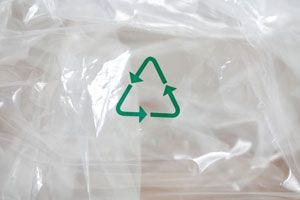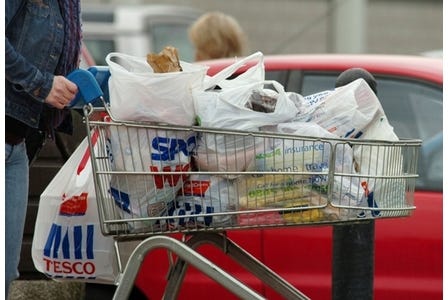UK groups urged plastic-bag-free Olympics, call for single-use bags levy in England
As the best athletes in the world compete for the gold, a plastic bag battle continues to rage.A London-based grassroots campaign had hopes that a plastic bag ban at the London 2012 Olympics would help earn a gold medal in sustainability.The group, called Greener Upon Thames, launched its campaign in 2010 to ban plastic bags at the London Olympics. The campaign was packed by high-profile names, which included Richard Branson and British fashion designer Vivienne Westwood.
August 2, 2012
As the best athletes in the world compete for the gold, a plastic bag battle continues to rage.
A London-based grassroots campaign had hopes that a plastic bag ban at the London 2012 Olympics would help earn a gold medal in sustainability.
The group, called Greener Upon Thames, launched its campaign in 2010 to ban plastic bags at the London Olympics. The campaign was packed by high-profile names, which included Richard Branson and British fashion designer Vivienne Westwood.
 The London Organizing Committee of the Olympic Games and Paralympic Games (LOCOG) had announced plans for London 2012 to become the first sustainable games.
The London Organizing Committee of the Olympic Games and Paralympic Games (LOCOG) had announced plans for London 2012 to become the first sustainable games.
Zac Goldman, co-founder of Greener Upon Thames, said for the games to be truly sustainable, plastic bags should be banned.
"If the 2012 Olympics are to be the greenest ever, then banning plastic bags is a prerequisite," he said. "They cause immense damage throughout the world, and absolutely symbolize the mindlessness of our throwaway society."
In 2011, London Mayor Boris Johnson called for a ban on plastic bags across London and said, "I've set out my ambition to make London a plastic bag free city."
However, LOCOG would not enforce ban on their suppliers and partners, but instead pledged to ban single-use plastic bags in its own shops.
A LOCOG spokesperson told the Guardian: "London 2012 is the first Games to not use any single-use or short-life disposable bags. All the bags we provide at the games will be reusable for multiple occasions and we believe that by focusing on reducing unnecessary bag usage, encouraging re-use and providing clear information about recycling, we have found the most sustainable and practical solution."
In a letter posted on The Telegraph website, Greener Upon Thames stated they were "delighted that LOCOG made its shops plastic bag free."
"We call on Olympic organizers, visitors, suppliers and sponsors to avoid the use of plastic bags," the group stated. "London 2012 provides a perfect opportunity to raise awareness and leave a lasting legacy in Britain and beyond."
Beyond the Olympics - plastic bag fight heats up
Going forward, Greener Upon Thames stated it will pressure the government for a ban or levy on single-use plastic bags.
Echoing that thought, it was recently announced that four environmental organizations have joined together to call for a levy on single-use bags in England, following what they called "the success of such levies in Wales and Ireland."
The Campaign to Protect Rural England (CPRE), Keep Britain Tidy, the Marine Conservation Society (MCS) and Surfers  Against Sewage (SAS) are calling on the government to require retailers to introduce a small levy on all single-use bags.
Against Sewage (SAS) are calling on the government to require retailers to introduce a small levy on all single-use bags.
Samantha Harding, CPRE Stop the Drop Campaign Manager, stated, "Bag levies have been proven to work in Ireland and Wales. A levy is coming soon to Northern Ireland and Scotland is already consulting on introducing one. Why must the English countryside be the last to benefit from good environmental policies?"
In 2010, Europe accounted for 57 million tonnes (21.5%) of the global production of plastics, with packaging representing 39% of the overall demand, according to the industry association, PlasticsEurope.
New data showed a rise in the number of single-use carrier bags used by supermarket customers across the UK during 2011, compared to the previous year, according to UK's Waste and Resource Action Program (Wrap).
The group reported a total of 8 billion 'thin-gauge' bags were issued in the UK in 2011, which represents a 5.4% rise compared with 2010 (7.6 billion).
The number of carrier bags used in England has increased despite repeated government calls for retailers to reduce the numbers they give out, the CPRE stated.
As expected, the plastics industry has taken issue with bag bans and taxes.
"The UK plastics industry opposes the idea of a plastic bag tax on principle, because it would unfairly discriminate against plastic materials and is based on a misinterpretation of the relationship between materials, the environment and the causes of litter," the British Plastics Federation (BPF) stated.
Northern Ireland recently announced a plastic bag tax that will start rolling out next year and the Scottish government is looking into imposing a bag tax.
The BPF believes litter is a problem of social behavior, and is not specific to any one material or product.
Political lobbying for a plastic bag tax in Northern Ireland is using the global issue of marine litter to divert attention from the fact that plastic carrier bags are resource efficient, according to a joint statement issued by the Plastics 2020 Challenge in which the BPF, PAFA, and PlasticsEurope are joint partners.
Plastics 2020 is a UK-based campaign designed to promote the waste management of used plastic packaging based on the on the principles of reduce, re-use, recycle and recover. The group looks to lead UK in diverting plastics from landfills, and to double the plastic packaging recycling rate by 2020.
"A levy on the plastic bag will not solve the root cause of the litter problem," said PlasticsEurope Regional Director Jan-Erik Johansson. "This can only be done by eliminating landfill and educating citizens, offering them responsible litter options. Litter is a result of poor waste management, lack of waste bins and irresponsible behavior."
About the Author(s)
You May Also Like


